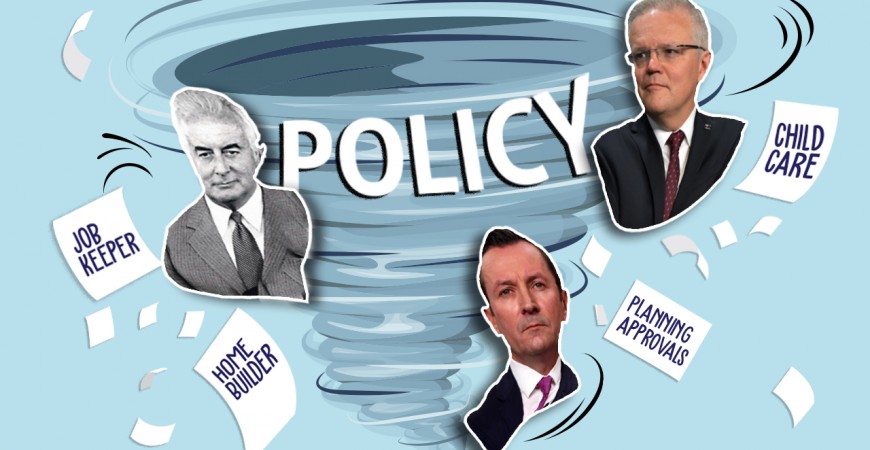The rapid change in government policy Australia has witnessed in the first half of 2020 hasn’t been seen since the early days of the Whitlam Government.
And, with the health, economic and political impacts of COVID-19 still playing out, the current policy whirlwind is set to last for some time to come.
For two weeks following his election win in 1972, Prime Minister Gough Whitlam formed a ‘duumvirate’ with his Deputy Lance Barnard. Together, they used executive power to implement many of Labor’s election commitments, including ending conscription, opening relations with China, removing sales tax from contraceptive pills, appointing an interim schools commission and banning South African sporting teams from Australia.
Whitlam’s duumvirate was about fast-tracking the implementation of policies that had been developed over 23 years in opposition and were clearly laid out in Labor’s platform.
During the COVID-19 crisis, neither employers nor employees have had this visibility of impending policy change. In responding to a crisis that few foresaw six months ago, we have seen a newly formed national cabinet develop and implement policies to address the health and economic impacts of COVID-19 in real time.
In response to the health crisis, borders have gone up and down, businesses have closed and opened, with the number of people we can associate with, as well as how close we can get to them, changing numerous times.
Changes in economic policy have included the introduction of wage subsidies and an effective living wage, free childcare, fast-tracked regulatory approvals and tighter foreign investment rules.
But we are not done, yet. In front of us lies the rolling back of some, but probably not all, of the COVID-19 emergency measures. New approaches to economic stimulus designed to mitigate the ongoing economic impacts of the crisis are certain, whether they be from the withdrawal of current government measures, or from a drop off in trade and international investment, as our major international partners face their own COVID-19 challenges. Further regulatory reforms designed to unlock private investment and job creation are also highly likely.
The risk of ongoing trade and diplomatic tension on the international stage is also real, with associated policy responses in Australia also possible.
The upside for both employers and employees as we move through this period of rapid change is that both the federal and state governments have been increasingly consultative in their development of COVID-19 period policy, as well as being open and responsive to feedback.
We all know that industry craves policy certainty, but, the reality is, policy certainty won’t return for quite some time. In this environment, all stakeholders will need to allocate resources to both shaping and responding to the change that will continue to come.
The Whitlam duumvirate lasted for only two weeks. The current period of rapid policy change could last years.
In this environment, all stakeholders need to keep their relationships with government strong and look for ways they can both shape new policy and assist its refinement in implementation.
 ReGen Strategic
ReGen Strategic